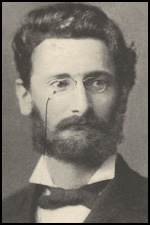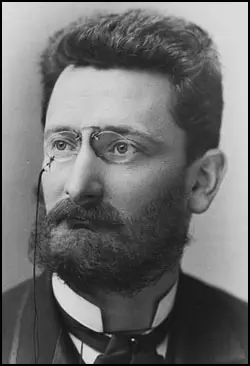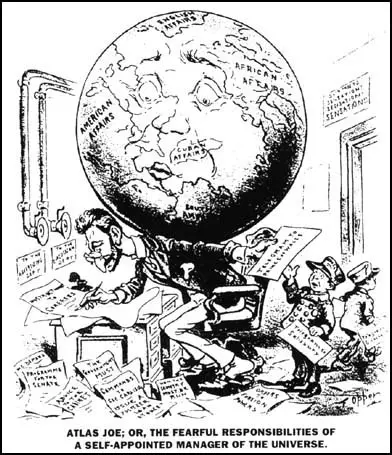Joseph Pulitzer

Joseph Pulitzer, the son of a grain dealer, was born in Budapest, in the Austro-Hungarian Empire in April, 1847. He emigrated to the United States in 1864 and settled in St. Louis. He worked as a mule tender, waiter and hack driver before studying English at the Mercantile Library. In 1868 Pulitzer was recruited by Carl Schurz for his German-language daily, the Westliche Post .
Pulitzer joined the Republican Party and was elected to the Missouri State Assembly. In 1872 he, like many Radical Republicans, supported Horace Greeley against Ulysses S. Grant, the official Republican candidate. Despite the efforts of Pulitzer and Carl Schurz in Missouri, Grant won the presidential election by 286 electoral votes to 66.
In 1872 Pulitzer was able to purchase the St. Louis Post for $3,000. This venture was a success and six years later was able to buy the St. Louis Dispatch for $2,700. He combined the two newspapers and launched crusades against government corruption, lotteries, gambling, and tax fraud. Pulitzer told his readers: "The Post-Dispatch will serve no party but the people; be no organ of Republicanism, but the organ of truth; will follow no causes bit its conclusions; will not support the Administration, but criticize it; will oppose all frauds and shams wherever or whatever they are; will advocate principles and ideas rather than prejudices and partisanship."
By 1883 Pulitzer was a wealthy man and was able to purchase the New York World for $346,000. The newspaper, which had been losing $40,000 a year, was turned into a journal that concentrated on human-interest stories, scandal and sensational material. Pulitzer also promised to use the paper to expose corruption: "We will always fight for progress and reform, never tolerate injustice or corruption, always fight demagogues of all parties, always oppose privileged classes and public plunderers, never lack sympathy with the poor, always remain devoted to the public welfare, never be satisfied with merely printing news, always be drastically independent, never be afraid to attack wrong, whether by predatory plutocracy or predatory poverty."
Pulitzer also used the New York World to advocate a ten-point program of reform: tax luxuries, tax inheritances; tax large incomes; tax monopolies; tax the privileged corporations; institute a tariff for revenue; reform the civil service; punish corrupt office holders; punish vote buying; punish employers who coerce their employees in elections. crusades against lotteries, gambling, and tax fraud.
Two years after Pulitzer purchased New York World in 1883, he recruited Richard F. Outcault as one of his artists. Outcault's comic cartoons based on life in the slums were extremely popular with the readers and sales reached 600,000, making it the largest circulating newspaper in the country.

In 1887 Pulitzer recruited Nellie Bly, a journalist working for the Pittsburgh Dispatch. Over the next few years she pioneered the idea of investigative reporting by writing articles about poverty, housing and labour conditions in New York. This often involved undercover work and feigned insanity to get into the insane asylum on Blackwell's Island. Her scathing attack on the way patients were treated led to much needed reforms.
After reading Jules Verne's Around the World in Eighty Days in 1889, Nellie Bly suggested to Pulitzer that the New York World should finance an attempt to break the record illustrated in the book. Pulitzer agreed and held a competition which involved guessing the time it would take Bly to circle the globe. Over 1,000,000 people entered the contest and when she arrived back in New York she was met by a massive crowd to see her break the record in 72 days, 6 hours, 11 minutes and 14 seconds.
In 1890 Pulitzer withdrew from the editorship of the New York World. Although only 43, Pulitzer was now virtually blind and for the rest of his life he was unable to return to the newsroom. However, he continued to manage the editorial and business direction of his newspapers.
In 1896 the New York World began producing a colour supplement, Richard F. Outcault created a new young character that wore a yellow nightshirt. Known as the Yellow Kid, this cartoon became so popular that William Randolph Hearst, owner of the New York Journal, offered him a considerable amount of money to join his newspaper. Pulitzer now employed George Luks to produce the Yellow Kid.
Hearst also reduced the price of the New York Journal to one cent and including colour magazine sections. Pulitzer's New York World and Hearst's New York Journal became involved in a circulation war, and their use of promotional schemes and sensational stories became known as yellow journalism. The tactics used during this campaign increased circulation and influenced the content and style of newspapers in most of the USA's major cities. Many aspects of yellow journalism, such as banner headlines, sensational stories, an emphasis on illustrations, and colour supplements, became a permanent feature of popular newspapers in the United States and Europe during the 20th century.

Pulitzer continued to promote investigative reporting and in 1909 the New York World exposed a fraudulent payment of $40 million by the United States to the French Panama Canal Company. The federal government indicted Pulitzer for criminally libeling President Theodore Roosevelt and the banker John Pierpont Morgan. However, Pulitzer won an important victory for the freedom of the press when the courts dismissed the indictments.
Pulitzer eyesight deteriorated rapidly during his later years and he was forced to retire. His newspaper empire came under the control of his son, Ralph Pulitzer. In 1911 the New York World published a letter from Joseph Pulitzer: "Every issue of the paper presents an opportunity and a duty to say something courageous and true; to rise above the mediocre and conventional; to say something that will command the respect of the intelligent, the educated, the independent part of the community; to rise above fear of partisanship and fear of popular prejudice. I would rather have one article a day of this sort; and these ten or twenty lines might readily represent a whole day's hard work in the way of concentrated, intense thinking and revision, polish of style, weighing of words."
Joseph Pulitzer died on 29th October 1911. In his will left $2 million for the establishment of a school of journalism at Columbia University. Pulitzer explained: "I am deeply interested in the progress and elevation of journalism, having spent my life in that profession, regarding it as a noble profession and one of unequaled importance for its influence upon the minds and morals of the people. I desire to assist in attracting to this profession young men of character and ability, also to help those already engaged in the profession to acquire the highest moral and intellectual training." He also left a fund that established annual prizes for literature, drama, music and journalism. Since 1922 Pulitzer Prizes have also been awarded to cartoonists.
Primary Sources
(1) Joseph Pulitzer, The Post-Dispatch (1878)
The Post-Dispatch will serve no party but the people; be no organ of Republicanism, but the organ of truth; will follow no causes bit its conclusions; will not support the Administration, but criticize it; will oppose all frauds and shams wherever or whatever they are; will advocate principles and ideas rather than prejudices and partisanship.
(2) Joseph Pulitzer, New York World (May, 1883)
We will always fight for progress and reform, never tolerate injustice or corruption, always fight demagogues of all parties, always oppose privileged classes and public plunderers, never lack sympathy with the poor, always remain devoted to the public welfare, never be satisfied with merely printing news, always be drastically independent, never be afraid to attack wrong, whether by predatory plutocracy or predatory poverty.
(3) Joseph Pulitzer, The North American Review (May, 1904)
Our Republic and its press will rise or fall together. An able, disinterested, public-spirited press, with trained intelligence to know the right and courage to do it, can preserve that public virtue without which popular government is a sham and a mockery. A cynical, mercenary, demagogic press will produce in time a people as base as itself. The power to mould the future of the Republic will be in the hands of the journalists of future generations.
(4) Joseph Pulitzer, The Post-Dispatch (1907)
I know that my retirement will make no difference in its cardinal principles; that it will always fight for progress and reform, never tolerate injustice or corruption, always fight demagogues of all parties, never belong to any party, always oppose privileged classes and public plunderers, never lack sympathy with the poor, always remain devoted to the public welfare, never be satisfied with merely printing news, always be drastically independent, never be afraid to attack wrong, whether by predatory plutocracy or predatory poverty.
(5) Just before his death in 1911 Joseph Pulitzer wrote a letter to the editor of the New York World.
Every issue of the paper presents an opportunity and a duty to say something courageous and true; to rise above the mediocre and conventional; to say something that will command the respect of the intelligent, the educated, the independent part of the community; to rise above fear of partisanship and fear of popular prejudice. I would rather have one article a day of this sort; and these ten or twenty lines might readily represent a whole day's hard work in the way of concentrated, intense thinking and revision, polish of style, weighing of words.
(6) In 1911 Joseph Pulitzer explained why he had bestowed an endowment on Columbia University in order to establish a School of Journalism.
I am deeply interested in the progress and elevation of journalism, having spent my life in that profession, regarding it as a noble profession and one of unequaled importance for its influence upon the minds and morals of the people. I desire to assist in attracting to this profession young men of character and ability, also to help those already engaged in the profession to acquire the highest moral and intellectual training.
